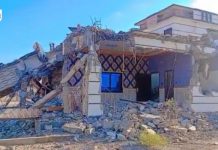Late on Wednesday night, prominent journalist and YouTube anchor Matiullah Jan was reportedly abducted from the parking area of the Pakistan Institute of Medical Sciences (PIMS) in Islamabad. The incident allegedly occurred at around 11 PM when unidentified individuals kidnapped Jan.
Journalist Saqib Bashir, who was accompanying him, was also taken but later released by the abductors in the I-9 Sector. According to Bashir, both were blindfolded and transported in a vehicle resembling a pickup truck.
Close associates of Matiullah Jan stated that their last contact with him was at 11 PM on Wednesday, and since then, his whereabouts have been unknown.
This is not the first time Jan has faced such an ordeal. In July 2020, he was abducted in broad daylight from the G-6 area of Islamabad. He was released 12 hours later, sparking national and international outrage over the incident.
The Pakistan Federal Union of Journalists (PFUJ) and various media organizations have strongly condemned this latest abduction and demanded his immediate recovery.
The State of Press Freedom in Pakistan
This incident once again highlights the alarming state of press freedom in Pakistan, which ranks 150th out of 180 countries in the 2024 World Press Freedom Index by Reporters Without Borders. Journalists in Pakistan face numerous threats, including harassment, abductions, and even assassinations, particularly when covering sensitive topics such as human rights abuses in Balochistan, enforced disappearances, or military operations.
Pakistan’s intelligence agencies, particularly the Inter-Services Intelligence (ISI), have frequently been accused of targeting journalists who criticize state policies or address controversial subjects. Investigative reporting on government corruption, the military’s role in politics, or insurgency issues often results in journalists facing threats or censorship.
Prominent cases, like the assassination of journalist Arshad Sharif in exile and attacks on renowned journalists and reporters such as Hamid Mir, have exposed the dangers journalists face. Additionally, several media houses face pressure to toe the state narrative, with dissenting voices systematically silenced through legal and extrajudicial means.
Matiullah Jan himself has long been an outspoken critic of the establishment and military interference in civil matters, which has placed him under constant scrutiny. His abduction is being seen as part of a broader campaign to stifle independent journalism in the country.
Amid increasing censorship and surveillance, the growing threats to press freedom in Pakistan have drawn sharp criticism from international human rights organizations, but the situation for journalists on the ground remains dire.






























